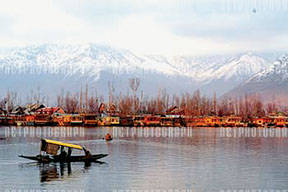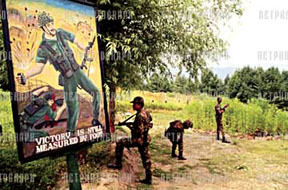|
observer |
|
|
|
|
|
OTHER LINKS |

|

|

|
|
Book Review Terrorism: The low intensity war
|
|
|
The well-known editors of this volume have been bringing out a series of journals to focus on different sources and aspects of existing and emerging conflicts in the Indian subcontinent. Terrorism and low-intensity wars, communal, caste and sectarian strife, political violence, organised crime, policing, the criminal justice system and human rights constitute the central focus of the journals in the series.
In the first article of this journal on LTTE's role in Sri Lanka, G. H. Peiris, Professor Emeritus of Sri Lanka, says that LTTE's recent declarations that it is willing to consider substantial power-sharing within the framework of a unified Sri Lanka are "no more than an ephemeral and inconsequential tactical adjustment of emphasis that does not swerve from their commitment to the objective of establishing 'Tamil Eelam'-an independent Tamil nation-state". The author repudiates the desire for setting up a federal system as it would be no agreement of significance in the sense that reaching "consensus on a constitutional change from 'unitary' to 'federal' does not even touch the genuinely contentious issues of ethnic relations in Sri Lanka".
He has selected certain case studies and these include conflicts in Centre-State and inter-State relations in India. He specifically mentions secessionism in Jammu and Kashmir, secessionist insurgency in the north-east, the Khalistan movement in Punjab, the inter-State river water disputes and the case of Nigeria, which from federalism has moved towards anarchy. To substantiate his contention the author describes the federal structure of Canada, Switzerland, Spain, Yugoslavia and other European federations. He very rightly cites the case of the tragic experiences of former Yugoslavia and some of its successor states such as Bosnia-Herzegovina to show that federal arrangements introduced to conflict situations in response to ethno-nationalist demands for self-determination have tended not only to intensify such conflict "but also to bring into being intrinsically unstable and anarchic 'national' entities."
Referring to the Kashmir issue, he says that the policy of granting special rights of self-determination to the State has been pursued since the early 1950s, but these attempts "have hitherto had hardly any success. The record leaves no room to doubt that the northern parts of the State including the Vale of Kashmir have remained, albeit tenuously, in the Indian Federation, due entirely to military control exercised by the Center." He adds that the "same would be said of the north-east where devolution of power through the device of creating new states has made little headway towards peace and stability."
G. H. Peiris concludes by saying that the dispute over whether Sri Lanka's Constitution should be 'unitary' or 'federal' is to a large extent, "one of semantics". He says the existing configurations of Sri Lanka's ethnic conflict show that "a negotiated agreement on a federal structure of government for the country is, in fact, no agreement at all because it does not touch the genuinely contentious issues of ethnic relations in Sri Lanka."
Nihar Nayak, a Research Associate at the Institute for Conflict Management in New Delhi, decries the growing tentacles of Maoists in Orissa. He concedes that there is lack of governance which has been responsible for underdevelopment, increased exploitation and inequality in rural areas, with the presence of Naxalites and their terror adding to the worsening plight of the common man. He regrets that even after the communist-led peasant movement in Koraput and Ganjam districts of Orissa in the 1960s, there has been no "coherent strategy of response in place". He calls for adoption of a systematic approach with a sensitive administration and proper understanding of the tribal problems to help "counter left-wing extremism in Orissa".
This is a journal meant to be read by all serious readers to obtain an understanding of the structures of society, politics, governance and complex interdependence necessary to provide stability, free from terror, in South Asia, particularly in India.
(Bulwark Books for the Institute for Conflict Management, 11 Talkatora Road, New Delhi-110 001)










